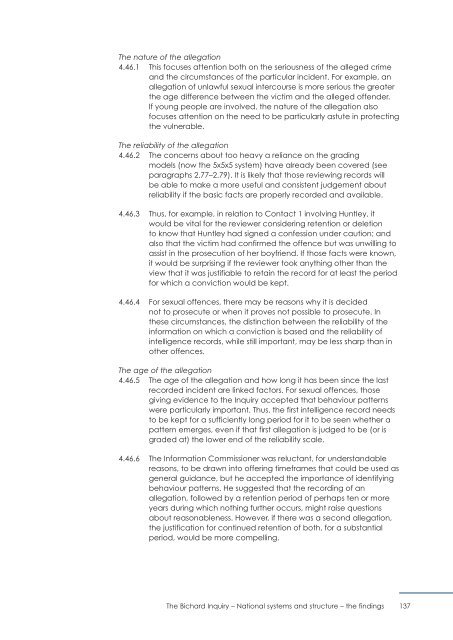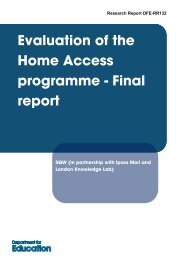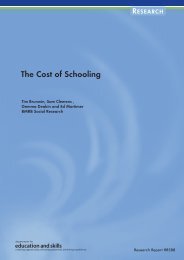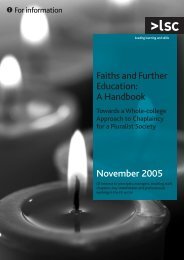The Bichard Inquiry - Report - Digital Education Resource Archive ...
The Bichard Inquiry - Report - Digital Education Resource Archive ...
The Bichard Inquiry - Report - Digital Education Resource Archive ...
You also want an ePaper? Increase the reach of your titles
YUMPU automatically turns print PDFs into web optimized ePapers that Google loves.
<strong>The</strong> nature of the allegation<br />
4.46.1 € This focuses attention both on the seriousness of the alleged crime<br />
and the circumstances of the particular incident. For example, an<br />
allegation of unlawful sexual intercourse is more serious the greater<br />
the age difference between the victim and the alleged offender.<br />
If young people are involved, the nature of the allegation also<br />
focuses attention on the need to be particularly astute in protecting<br />
the vulnerable.<br />
<strong>The</strong> reliability of the allegation<br />
4.46.2 € <strong>The</strong> concerns about too heavy a reliance on the grading<br />
models (now the 5x5x5 system) have already been covered (see<br />
paragraphs 2.77–2.79). It is likely that those reviewing records will<br />
be able to make a more useful and consistent judgement about<br />
reliability if the basic facts are properly recorded and available.<br />
4.46.3 € Thus, for example, in relation to Contact 1 involving Huntley, it<br />
would be vital for the reviewer considering retention or deletion<br />
to know that Huntley had signed a confession under caution; and<br />
also that the victim had confirmed the offence but was unwilling to<br />
assist in the prosecution of her boyfriend. If those facts were known,<br />
it would be surprising if the reviewer took anything other than the<br />
view that it was justifiable to retain the record for at least the period<br />
for which a conviction would be kept.<br />
4.46.4 € For sexual offences, there may be reasons why it is decided<br />
not to prosecute or when it proves not possible to prosecute. In<br />
these circumstances, the distinction between the reliability of the<br />
information on which a conviction is based and the reliability of<br />
intelligence records, while still important, may be less sharp than in<br />
other offences.<br />
<strong>The</strong> age of the allegation<br />
4.46.5 € <strong>The</strong> age of the allegation and how long it has been since the last<br />
recorded incident are linked factors. For sexual offences, those<br />
giving evidence to the <strong>Inquiry</strong> accepted that behaviour patterns<br />
were particularly important. Thus, the first intelligence record needs<br />
to be kept for a sufficiently long period for it to be seen whether a<br />
pattern emerges, even if that first allegation is judged to be (or is<br />
graded at) the lower end of the reliability scale.<br />
4.46.6 € <strong>The</strong> Information Commissioner was reluctant, for understandable<br />
reasons, to be drawn into offering timeframes that could be used as<br />
general guidance, but he accepted the importance of identifying<br />
behaviour patterns. He suggested that the recording of an<br />
allegation, followed by a retention period of perhaps ten or more<br />
years during which nothing further occurs, might raise questions<br />
about reasonableness. However, if there was a second allegation,<br />
the justification for continued retention of both, for a substantial<br />
period, would be more compelling.<br />
<strong>The</strong> <strong>Bichard</strong> <strong>Inquiry</strong> – National systems and structure – the findings 137
















